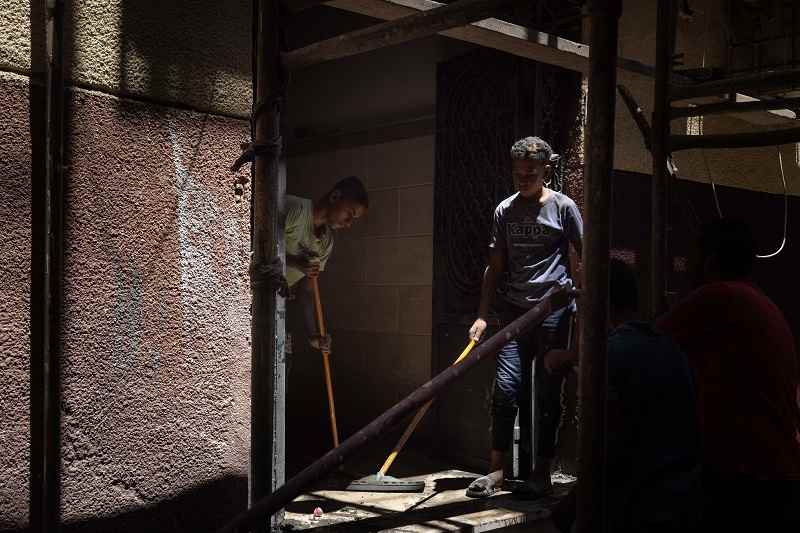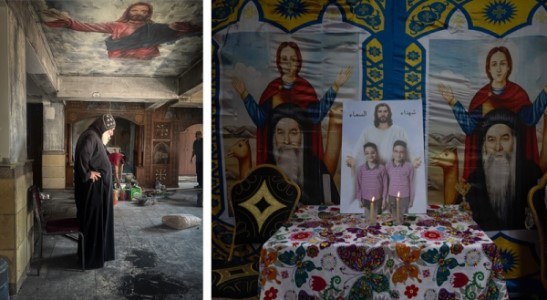After deadly church fire, Egyptian neighborhood searches for answers

Cleanup begins after a fire Sunday that killed 41 people at the Abu Seifein Church in Giza, Egypt.
13:57 JST, August 16, 2022
GIZA, Egypt – The back roads of a working-class neighborhood in greater Cairo transformed into makeshift funeral parlors on Monday, as a community confronted the devastating aftermath of a church fire that killed 41 people, including many children.
In one family, a husband lost his wife and all three children. In another, the parents – expecting their third child later this year – lost both their sons.
The blaze early Sunday ripped through a small Coptic church that also hosted a day care in the crowded Imbaba neighborhood, leaving both parishioners and children caught inside.
Officials blamed the tragedy at the Abu Seifein Church on an electrical problem that set fire to an air conditioner, trapping worshipers gathered on the four-story building’s upper floors in thick smoke.
Within hours, workers already were cleaning up the debris and painting over the building’s charred walls. But evidence of the disaster remained on Monday: A child’s tiny, blackened sandal, abandoned on the church’s indoor steps. Religious paintings, covered in soot, and wooden pews, stacked on the street.
And in keeping with tradition, tents were hastily set up outside home after home so grieving families could receive friends and neighbors coming to pay their respects.
State-run media reported that the interior ministry said the first ambulance reached the scene just two minutes after it was notified of the fire. Yet bereaved relatives of the dead and injured angrily faulted emergency responders as slow to arrive at the scene, which they said hindered the rescue process and caused more deaths.
Some witnesses described crowds gathering outside the burning church after flames broke out, with civilians trying to save those inside while waiting for official rescuers to arrive.
“What we’re saying is ‘God forgive the fire department,'” said Ishak Henin, 61, a church deacon who was not present when the blaze began but rushed there soon after. “If they had come earlier, they could have saved more people.”
The competing narratives over the official response are adding to the sense of despair in Imbaba. The tragedy is the latest to befall Egypt’s minority Coptic community.
In 2011, amid social unrest, mobs burned several churches in the same neighborhood. Extremists also targeted Coptic churches in terrorist attacks, including in 2016 and 2017. The community has long lamented Egyptian regulations that have made it difficult for them to acquire permits necessary to build new churches – forcing them to use makeshift spaces for worship.
Following Sunday’s fire, the Egyptian government promised compensation for victims’ families and vowed to swiftly repair the church. In addition to those killed, more than a dozen people suffered burns and other injuries.
But Kheir Abdu, who was mourning the deaths of a sister-in-law, niece and two nephews, said his focus was on preventing another catastrophe. Because President Abdel Fatah al-Sissi has issued more permits for churches, “we really ask of him that the government build a more suitable church for us.”
“If we renovate the same church, we are doing nothing,” Abdu added.
He stood outside one home with others trying to comfort that one family’s sole survivor, a distraught husband and father named Bassem.
“His eyes are wide open, and he doesn’t say anything,” another relative said. “In just a second, his wife and all three children were buried at once.”
It was not immediately clear what fire prevention methods the Abu Seifein church had put in place. Henin, the church deacon, said that there were only extinguishers, not fire alarms, and that the main exit was out the front door, which was made inaccessible by smoke and flames.
“We don’t have a lot of places to build as churches. This is why we had to build a tall building to build a church,” he said. “If we don’t learn from this experience, it could happen again.”
Some victims had been taken by ambulance late Sunday to a larger church nearby. Hundreds of people were gathered there and cleared the way for pallbearers to carry coffins, some hardly a few feet long, inside. Burials continued for several hours.
Mary Hakeem lost her two sons, Kirollos and Bishoy. On Monday afternoon she lay silent in a room in her home, eyes closed. A crowd of family members dressed in black surrounded her.
Eventually, they helped her make her way outside where mourners had filed into the alley to offer condolences to her and her husband. One visitor unveiled a portrait of the two boys that showed them standing side by side in matching outfits and glasses, an image of Jesus Christ superimposed behind them. The man lit two candles and then stepped away.
The boys’ father, Youssef Samir, sat quietly, his eyes puffy from grief.
Samir’s aunt, Mariam Mohib, had traveled several hours to make it on time for the burial Sunday evening.
“It was a shock seeing the caskets come in,” she said. “We didn’t know how to console the parents.”
Relatives said the two brothers, who were in fourth and sixth grade, were unusually kind to each other and would often link arms to stroll through the neighborhood and make deliveries from their father’s clothing store. “They honestly were very genuine children,” Hana Salib said.
One of the boys’ aunts, whose family lives in the same apartment building, said her children are confused over the sudden disappearance of their favorite cousins.
“My 5-year-old asked, ‘Are we not going to play with Bishoy again?'” Riham Nasr said.
Nasr struggled to explain why they wouldn’t.

Left : A priest visits the Abu Seifein Church to pay his respects Monday
Right : Brothers Kirollos Youssef Samir and Bishoy Youssef Samir were among the victims of the fire at Abu Seifein Church.





